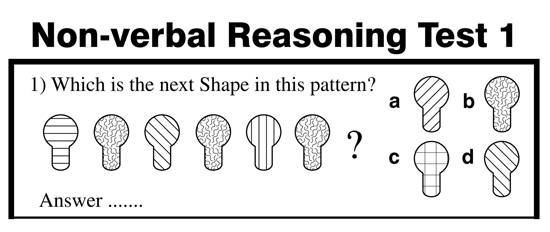Why does non-verbal reasoning form such an important part of many eleven plus examinations?

The University of Kent defines non-verbal reasoning (NVR) as ‘the ability to understand and analyse visual information and solve problems using visual reasoning’. It also states that the development of this particular skill ‘enables students to analyse and solve complex problems without relying upon, or being limited by, language skills’.
Such tests allow examination providers to assess children’s visual acuity, speed of perception, and ability to recognise and manipulate objects. This particular type of test is fairer than simply testing children’s literacy and numeracy skills, since it bypasses language acquisition and mathematical ability, which are easier to acquire through extensive exposure and practice. As a means of testing, NVR provides a more level playing field for children sitting eleven plus examinations as a child’s social background, facility with language, or ethnicity will not necessarily affect their ability in exercising this particular skillset.
Many children who are sitting eleven plus examinations that have a high English content could be disadvantaged if they are from ethnic backgrounds that do not have English as a first language, are from a poor social background or are simply not very gifted in the subject. To some extent this also applies to maths, when question content often requires a high level of competence in English in order to understand the problem, let alone solve it.
Non-verbal reasoning tests form part of the testing process used by CEM (Centre for Evaluation and Monitoring) and GL (Granada Learning) Assessment. Both of these examination providers have recognised that this is an important way of assessing children’s ability.
However, although NVR is not necessarily a skill that can be taught in a conventional sense, children are able to hone and improve their skills in this area, through practice and familiarisation. Some children have more natural ability in this subject area, but all children will benefit from working at their NVR skills. Strong NVR skills help children see how patterns form, and assist in developing their conceptual and imaginative ability. In NVR questions children are constantly faced with novel material and, to solve the problem, cannot draw on more conventional knowledge they have previously learnt. Acquiring these kinds of visual reasoning skills is especially useful for geometry in maths, aspects of science, and computing. Many employers also use NVR testing as part of their recruitment process.
Even if NVR does not appear in the eleven plus examination or which your child is preparing, it may still be worth investing some time in practising NVR tests. This is because acquiring superior NVR skills may indirectly improve children’s literacy and numeracy skills. There are numerous NVR tests available online and these are always useful for practice and familiarisation purposes. However, if your child is sitting a standard NVR test in their eleven plus examination, it is best to prepare them by handling paper-based tests to ensure they have had sufficient practice in this style of testing.
Working through the AE Publications’ series of non-verbal reasoning workbooks and the testbook is an excellent way to prepare your child for these examinations.

